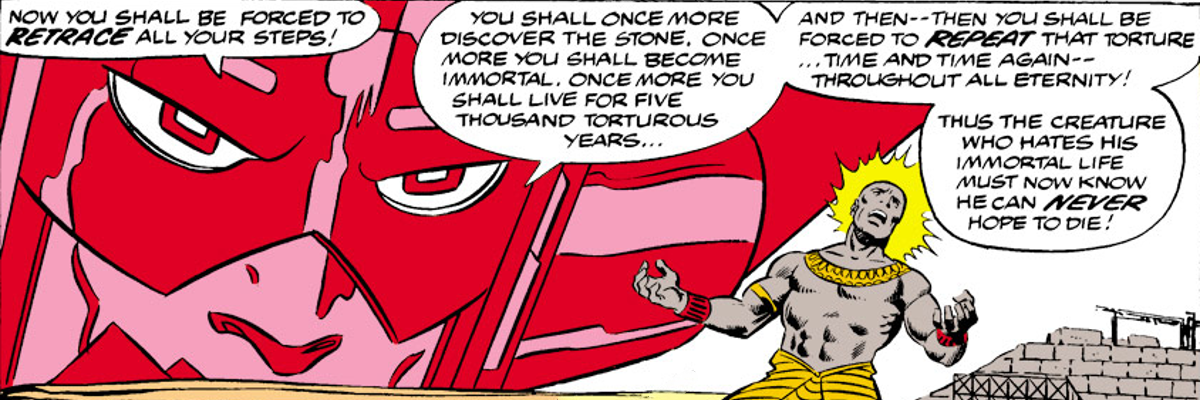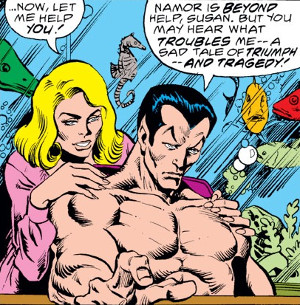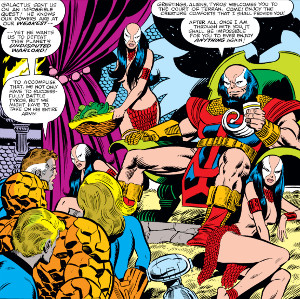Interview with Marv Wolfman
Originally published October 2016.

"I never wrote down to a very young audience, not even when I wrote Disney stuff."
Marv Wolfman was the regular writer of The Fantastic Four during the late 70s, writing a 22 issue run from #195-216. In addition, he wrote the fill-in Issue #190, along with annuals #12 and #14, and plotted #217 before leaving the title. In October 2016 Marv answered some questions about his work on the book…
When you started your regular run on the title, the group had split up and Reed had lost his powers. Len Wein gave an interview to the site where he said that his plan was to "spend a year telling essentially solo stories", but left the book before he could continue the plotlines. Within just a few issues of you taking over, Reed has his powers back and the group are back together. Were you eager to return to the status quo as soon as possible, and did you discuss the direction that Len was planning to go?
I don't remember now if Stan ever broke up the team, but I seem to remember every writer since him did, for dramatic purposes. But to me the FF was a family and you kept them together. Maybe one stalks off for an issue or two but you don't break them up. So my first goal was to immediately bring them back together again and find my drama in telling their story, not in splitting them up yet again. And if memory serves I didn't discuss that direction with anyone.
 You started off with Keith Pollard as artist. Were these issues done in the old "Marvel Method" style, or full plot? Keith's pencils in your first issue seems to indicate that Sue is closer to Namor than your writing suggests, almost like there's a romantic element involved that you choose to overrule.
You started off with Keith Pollard as artist. Were these issues done in the old "Marvel Method" style, or full plot? Keith's pencils in your first issue seems to indicate that Sue is closer to Namor than your writing suggests, almost like there's a romantic element involved that you choose to overrule.I wrote very detailed plots, page by page, and Keith took them and turned them into great visual stories. I don't remember now the Namor bit you brought up. Sorry.
During your run NBC were airing a new cartoon series based on the comic, with Johnny replaced by HERBIE the Robot. Were you fond of the series? There's plenty of playful digs at the show in the comic itself.
I did not like the cartoons. And I hated Herbie. But since I was a Marvel writer I did not feel it right to come out against him and tried to write the best stories I could, even with Herbie in it. I couldn't wait to utterly destroy him, tho.
John Byrne was critical on his forum of a story where scary doppelgangers of the group came to life, stating that the Thing is supposed to be a scary monster in the first place. The character's a likeable one, and you have him bowling and playing Scrabble, being probably the most relatable character in the title. Was there the temptation to make him TOO likeable? In the years since you wrote the title, he's become more of a quipping figure, falling way down in the pecking order of Marvel strongmen, and more of a figure of fun.
I think if I made Ben more fun it was to keep the duo nature of the character going. The Thing's body may be scary, but Ben Grimm was a good guy. His anger was all self-hatred for what he became, but after a while you either stop berating yourself constantly and move on or sink even deeper into self despair. I chose that he came to terms with what he was and unless his monster side was 100% shoved in his face he could mostly deal with it.
Talking of John Byrne, he worked on the title during your second year, pencilling on model in what he termed the function of "art robot". How much communication was there between the two of you on the title? The density of these issues suggests to me that it was on full script?
I gave John full plots, as I did Keith and others, and John had, of course, the freedom to play with them. If he thought he was an art robot, well, okay. He did a really nice job and the book looked good. He of course went on to write the book as well as draw it and frankly that work was better because, I think he was more invested in it. But even as an art robot it was good.
In modern comics, then extended stories seems to have become the norm, but you were the first to really do it on the Fantastic Four title, giving readers an 11-issue epic in your second year. I gather this was because the Nova title got cancelled and some storylines got shifted across?
Don't remember.
I read that you don't regard your run on the FF that highly, but there's some spectacular stuff in there, particularly with the Sphinx aware of his own fate and realising that he must relive his own destiny in eternal cycles… it's almost like you brought Nietzsche to the FF. Did you see it as almost a responsibility to bring a literary edge to the title?
I really loved the Sphinx character and his background. I'd always been shocked nobody ever thought to use the Egyptian sorcerer who matched Moses step by step as a character somewhere. It's all great SF/fantasy. Heaven's no I wasn't bringing a literary edge to the FF. I came up with a character and like I try to do with all characters, fully inhabit them so I know what they're like and what they'd do in any circumstances. I was just trying to be logical and honest to the character. Nothing deeper.
 With today's comics, there sadly seems to be little available for the child audience to read, with many of them far too explicit for an "all ages" audience. However, they were already getting fairly advanced even in the late 70s, with the first meeting of Terrax featuring topless handmaidens and him suggesting Sue join his harem. Do you think you struck the ideal balance?
With today's comics, there sadly seems to be little available for the child audience to read, with many of them far too explicit for an "all ages" audience. However, they were already getting fairly advanced even in the late 70s, with the first meeting of Terrax featuring topless handmaidens and him suggesting Sue join his harem. Do you think you struck the ideal balance?Not for me to judge. I don't even remember topless hand maidens. But I will tell you I was aware the readers were no longer 8-12. They were probably 12-16 back then. Older later on and now they've got the same gray hair I do. So I never wrote down to a very young audience, not even when I wrote Disney stuff.
Finally, you left the title during the middle of a story, leaving a plot behind for Bill Mantlo to complete. I gather you left to write Spider-Man and then cross over to DC? Would you have liked to have continued?
I wrote Spider-Man concurrently with the FF. I would have loved to continue on Spidey, certainly, but back then you could only work for one company.
With huge thanks to Marv for answering questions about his time on the book. You may have noticed that I came up with some particularly dumb questions for this interview, but none dumber than one where I said Gerry Conway invented Reed and Doctor Doom being college classmates. Although there's not always time to reread every single issue when preparing for interviews, I should have remembered that Reed recognised Doom as a former classmate in the very first Doctor Doom story.
In my defence, the first time they meet Reed talks as if he's just someone he was aware of, not that their paths had directly crossed, and it was Annual #2 where Stan and Jack gave a little retcon to have Reed, Doom (and Ben) college classmates. But either way, it's a question so badly-researched that I've omitted it from the main bulk of the interview, but it's presented here for completeness' sake:
One thing that's surprising is that, looking back on Stan and Jack's run, there's a lot of things that became part of the mythology that we assume were there from the beginning, such as Ben being born on Yancy Street, or Dr. Doom and Reed Richards having a college rivalry that motivates their clashes. However, going back over the run, Doctor Doom notes on one occasion that Reed possibly led to his downfall, but never mentions it to him, and Reed never recognises him as his old classmate until Gerry Conway came on board the title. Your take on Doctor Doom expands on the personal nature of their clashes more than ever before, whereas Lee-Kirby just had him as a conqueror with no great personal stake in their battles. Were you aware that you were breaking new ground when you wrote the old 60s characters in the title?
No. Stan and Jack set up everything we did. They might not have delved deeply into it, but it all stemmed from them. And those who followed extrapolated what they might have done had they stayed on longer.
Marv Wolfman, thank you very much.